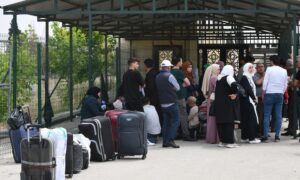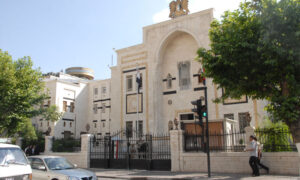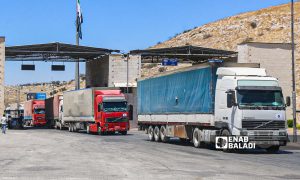One-year anniversary of Syria’s February 2023 earthquakes
Dan Stoenescu
The Chargé d’Affaires of the European Union to Syria
One year ago, on the 6th of February 2023, a devastating 7.8 magnitude earthquake hit southern Türkiye and northern Syria, followed by another 7.7 magnitude earthquake and several other rounds of aftershocks. This natural disaster claimed the lives of more than 59 000 people and injured over 120 000 people, while displacing millions.
The earthquake added to the pain of the Syrian people, who had already suffered from over a decade-long war, causing humanitarian crisis and economic collapse. The earthquake damaged hundreds of health facilities, schools, water and sanitation systems and electricity networks, exacerbating the vulnerability of millions of Syrians, including the internally displaced.
Myself, in Beirut, I felt the earthquake and immediately contacted our humanitarian arm ECHO and the EU member states to provide and coordinate first relief aid to the people in need. The European Union (EU) Delegation Syria together with the Headquarters in Brussels answered to the calls for help. The EU reacted fast and played an important role in providing the rapid relief to those affected. This included activation of the European Humanitarian Response Capacity providing the needed funds. EU stockpiles were mobilized to deliver emergency supplies to the whole of Syria.
In addition, the EU Civil Protection Mechanism was activated and 15 EU Member States and 1 Participating State delivered relief items including blankets, field beds, tents, heaters, power generators, medical consumables and medical units etc. In this context, the EU amended restrictive measures in place regarding Syria to facilitate the speedy delivery of humanitarian aid. Dozens of planes from the EU flew much-needed humanitarian aid to Beirut, Gaziantep and Damascus to relief the needs of the Syrian people in all areas affected by the earthquake.
Some member states even delivered aid by ships via Lebanon or directly through Syrian ports. Moreover, so many citizens of the EU felt a need to get involved and personally help the victims. For example, thousands of citizens in my home country Romania donated food, clothes and money in coordination with local authorities, churches and the civil society. Additionally, the EU organized the ‘Together for the people of Türkiye and Syria’ International Donors’ Conference, in March 2023 to mobilize funds from the international community, pledging a total of EUR 7 billion.
In 2023, the European Commission allocated EUR 186.5 million in humanitarian aid to assist millions of people inside Syria. In addition, the EU committed funding for post-earthquake human security and resilience to local partners for infrastructure rehabilitation and spaces with basic services such as health, education, wellbeing and livelihoods. This aims to increase the capacity of local actors to address community-driven and conflict-sensitive disaster planning and response, along with social cohesion and peaceful coexistence.
Although the earthquake took place in February last year, its disastrous aftermath continues to affect millions of Syrians. In order to mitigate the negative impact, in September 2023, the EU announced a new commitment in funding to the White Helmets, a key organisation for civil defence in Syria in order to alleviate the impact of the earthquakes. This support focuses on addressing the challenges faced by the affected communities in Aleppo and Idleb, enhancing community resilience through rubble management and infrastructural improvements. In addition, the project offers critical support to women by providing access to psychosocial services, safeguards children by rehabilitating schools and enhancing health and safety conditions and invest in community preparedness activities to strengthen disaster planning and response.
Unfortunately, many of the affected areas were also war-torn areas, heavily impacted by the protracted crisis. Therefore, we focussed our assistance also on resilience and rehabilitation. For example, EU supported international organisations such as Solidarités International to enhance access to education and health services in northwest Syria. Certain facilities have already been identified and it is expected that in spring those facilities will be rehabilitated, improving access to education for an estimated 8,000 students and 300 schools’ administrators, and health services for an estimated 90,000 individuals.
Another example is our support for War Child Holland to strengthen child protection systems and awareness, increase the capacity of local actors, provide quality and safe education and offering specialized child protection services and psychosocial support. Through this project four schools have already been rehabilitated, 3885 children benefited from the Back to Learning campaign and 1903 children registered for Remedial education.
Moreover, the EU adopted in the second part of 2023 a package of EUR 57 million of non-humanitarian assistance for the Syrian people with a focus on areas affected by the earthquake. The EU intends to partner in 2024 with local and international civil society organizations to encourage children of the areas affected by the earthquake to reintegrate or stay at their schools, provide farmers of these areas with inputs, infrastructures and equipment to increase their productivity and improve the access of people to health services and essential medicine.
After the termination of UN mechanism, we reiterate our call for a more sustainable and reliable solution for the cross border assistance to allow continued and predictable access to vulnerable populations in need in northwest Syria.
In face of this tragedy, it was proven again that the EU and its Member States remain the leading donors of international aid in response to the Syria crisis. Over the past almost 13 years, the EU and its Member States have collectively mobilised over EUR 30 billion to assist those affected by the war. At the Seventh Brussels Conference on Supporting the future of Syria and the region, hosted in June 2023 by the EU, the international community pledged EUR 5.6 billion for 2023 and beyond for supporting people inside Syria and the neighbouring countries hosting Syrian refugees.
Unfortunately, just providing assistance, including early recovery and resilience assistance, is not enough. It is high time to go beyond this but in order to do that we need to tackle the root causes of the humanitarian and economic crisis and give a renewed impetus to a real political solution. As the EU remains committed to continue supporting the Syrian people, we are firm in keeping the political solution high on the agenda.
We recall that the only path to sustainable peace for Syria is a political solution in line with United Nations Security Council resolution 2254. The EU is firm in its commitment towards this goal and supports the continuous efforts of United Nations Special Envoy Geir Pedersen to advance on all aspects of United Nations Security Council resolution 2254, including his “step-for-step” approach in furthering the political process and an early resumption of the work of the Constitutional Committee.
On this one-year anniversary of the February 2023 earthquake, we have witnessed the courage and resilience of Syrian people. We will not stop to remain engaged in finding solutions and continuing to maintain the world’s attention on Syria. In an even more turbulent regional context today, I want to reiterate the EU’s full support for a peaceful, stable and prosperous future for Syria and its people.
Dan Stoenescu is the Head of the EU Delegation to Syria since September 1, 2021. Before joining the European External Action Service as a Romanian diplomat, he served as an Ambassador of Romania to the Republic of Tunisia (2017-2021). In addition to several roles within the Middle East and North Africa, Latin America and Diaspora departments of the Ministry of Foreign Affairs, he held the position of Minister-delegate for Romanians abroad (2015-2016) in the Government of Romania.
if you think the article contain wrong information or you have additional details Send Correction
-
Follow us :
Most viewed
- Potential Erdoğan-Assad meeting in Moscow: Talks of excluding Iran
- European countries call for re-evaluation of policy towards Syria
- After Turkey and the opposition, SDF shows willingness to dialogue with Syrian regime
- Al-Assad reproduces Constitutional Committee through People's Assembly
- After al-Hasakah, AANES releases prisoners in Raqqa

















 A
A
A
A
A
A








 More Opinion
More Opinion